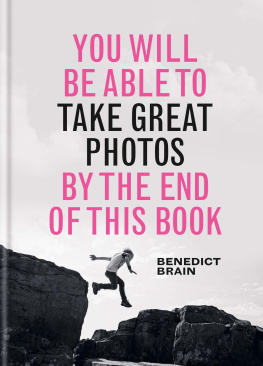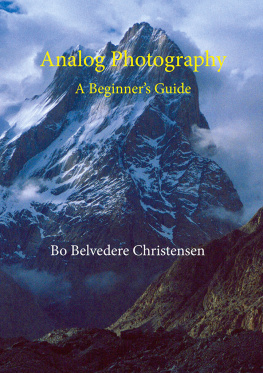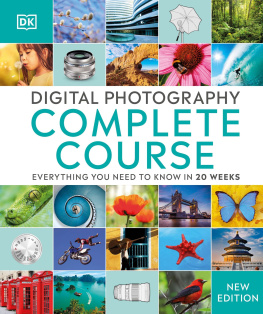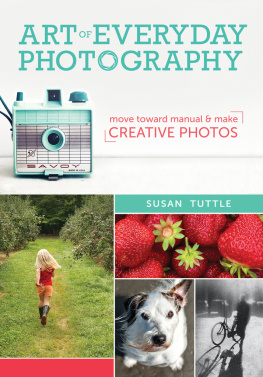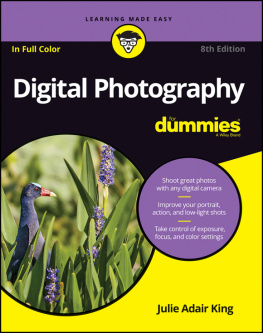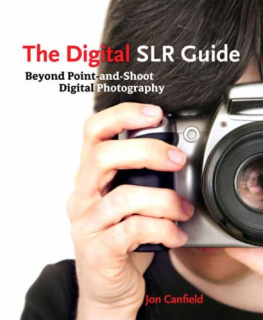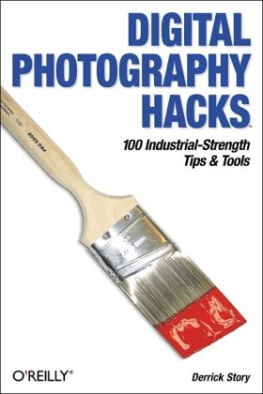Great Photos Simple Cameras
Great Photos Simple Cameras
From Holga to Pinhole: An Alternative
Approach to Creative Photography
Bernd Daub
Bernd Daub (http://www.Lomography.meinatelier.de)
Editor: Gerhard Rossbach
Copyeditor: Jeanne Hansen
Layout and Type: Nadine Thiele
Cover Design: Helmut Kraus, www.exclam.de
Printer: Tallinna Raamatutrkikoja O
Printed in Estonia
ISBN 978-1-937538-02-6
1st Edition 2012
2012 by Bernd Daub
Rocky Nook Inc.
802 East Cota St., 3rd Floor
Santa Barbara, CA 93103
www.rockynook.com
Copyright 2012 by dpunkt.verlag GmbH, Heidelberg, Germany.
Title of the German original: Gute Fotos simple Technik
ISBN 978-3-89864-783-0
Translation Copyright 2012 by Rocky Nook. All rights reserved.
Library of Congress Cataloging-in-Publication Data
Daub, Bernd, 1954
Great Photos - Simple Cameras: from Holga to pinhole : an alternative approach to creative photography /
by Bernd Daub. -- 1st ed.
p. cm.
ISBN 978-1-937538-02-6 (softcover : alk. paper)
1. Cameras. 2. Photography, Artistic. I. Title.
TR250.D28 2012
771.3--dc23
2012009973
Distributed by OReilly Media
1005 Gravenstein Highway North
Sebastopol, CA 95472
Many of the designations in this book used by manufacturers and sellers to distinguish their products are claimed as trademarks of their respective companies. Where those designations appear in this book, and Rocky Nook was aware of a trademark claim, the designations have been printed in caps or initial caps. They are used in editorial fashion only and for the benefit of such companies, they are not intended to convey endorsement or other affiliation with this book.
No part of the material protected by this copyright notice may be reproduced or utilized in any form, electronic or mechanical, including photocopying, recording, or by any information storage and retrieval system, without written permission of the copyright owner. While reasonable care has been exercised in the preparation of this book, the publisher and author assume no responsibility for errors or omissions, or for damages resulting from the use of the information contained herein.
This book is printed on acid-free paper.
Preface
Whats your preference: simple or complicated? Most people would say simple. Why make life more difficult than it needs to be? Who wouldnt prefer an easy, uncomplicated life? The simpler, the better, without questionright?
If you take a closer look at our everyday lives, though, youll see that theyre anything but uncomplicated and that we actually are confronted with the opposite: complexity instead of simplicity, multiplicity instead of minimalism, a worried mind instead of a carefree one. We live in a time of advanced technological complexity that has so enriched our lives that we try to emulate its dynamic in our personal lives. Much of our stress and obligations are heaped on us from outside sources; its hardly possible to buy public transit tickets from a person at a counter or on the bus anymore. You must instead buy them from an automated machine that can present a real challenge for the uninitiated. Our jobs further create unavoidable burdens, and as if that werent enough, we throw on plenty of additional obligations in our personal lives as well. Instead of the quality of life afforded through simplicity, we opt for countless features of complexity that we actually believe make our lives better.
The complexities start to mount first thing on a workday morning with our clock radio that is supposed to wake us gently from our slumber with a slowly increasing volume. In addition to playing the radio, our alarm clocks also need to be able to play natural sounds and our favorite MP3s. Furthermore, they should kindly remind us in programmable time intervals that we still havent woken up to the previous signal. Finally, they should be able to project the time directly onto our ceilings (in either 12- or 24-hour mode) so we know that were already running late. At this point, its time to inform our boss and colleagues with our smartphones that were behind schedule. The traditional way to do this would be to make a call, but nowadays people rely on shooting off a quick text message instead. We can even opt to send a picture, showing us with dark rings around our eyes and disheveled hair. Now real expediency is needed. We move on to our automatic coffeemakers that are programmed to run at just the right moment with a customized amount of water and correctly ground beans to produce the ideal personalized beverage that will provide us with just enough of that stimulating drug, caffeine, to help us fight off our need for more sleep.
Finally we make it to the weekend, which normally gets off to a somewhat simple start, namely without the alarm clock. We can simply get the sleep that our bodies need. But the coffeemaker, which has been switched to its weekend program sequence, unceremoniously brings us back into the daily grind. We turn on our computersmachines whose full complexity we can only begin to understand because we use only a small portion of their features. One of those features, the Outlook calendar, is especially important to us, since we need to consult it before we even eat breakfast so we know what needs to be accomplished on our so-called day of rest.
But it is not just that we demand an unmanageable range of features from the technical products in our everyday lives, we also demand that they work perfectly. We have dismissed a few of the classic sources of anxiety, such as matching the perfect necktie with your shirt (who wears a tie?), finding a matching handbag for your dress (a sporty outfit and a backpack are much more practical), and getting the car polished every Saturday (a hot wax from the car wash every now and then will do). Nevertheless, if you get the latest tech gear for yourself (during the short window of time that it actually is the latest tech gear), you simply cant let its results be outdone. Our most important home appliance, the television, is simply the purest agony for the human eye unless it has the latest HDMI technology. Similarly, our ears are not adequately served by sound systems that dont have the most technologically advanced, realistic surround sound.
The camera integrated into your cell phone, a feature that now indubitably belongs on every one of these devices originally designed to make telephone calls, must not only take pictures, it must take pictures of the highest possible quality. Never mind that no one really uses these pictures for anything other than to send them to friends who, in turn, view them on tiny cell phone screens. These images have no need for the level of quality required for a razor-sharp 810 inch print. No one even bats an eye at any of this.
Now weve reached the subject of this book: photography. In this realm, too, there is no limit to the amount of technology you can incorporate into your craft. But you can also do it simply.
I find the expression simplify your life very applicable to the world of photography. I also like the ironically inverted expression, Why make it simple, when it could be complicated? (read: expensive).
Lets trade in the stiff suit of complicated photography for the T-shirt and baggy jeans of a take-it-easy approach to snapping great pictures. I wish you much enjoyment on your path to creating great photos with simple cameras.
Bernd Daub
Introduction: Creativity without a Straitjacket
The constant drive for more complex systems has created a noticeable change in the photography industry. Manufacturers build cameras with ever more features and functions to remain competitive. For decades now, consumers have grown accustomed to new technologies developed by product engineers that supposedly make our cameras smarter. These new featureswhich we never would have thought useful beforeare now considered
Next page

